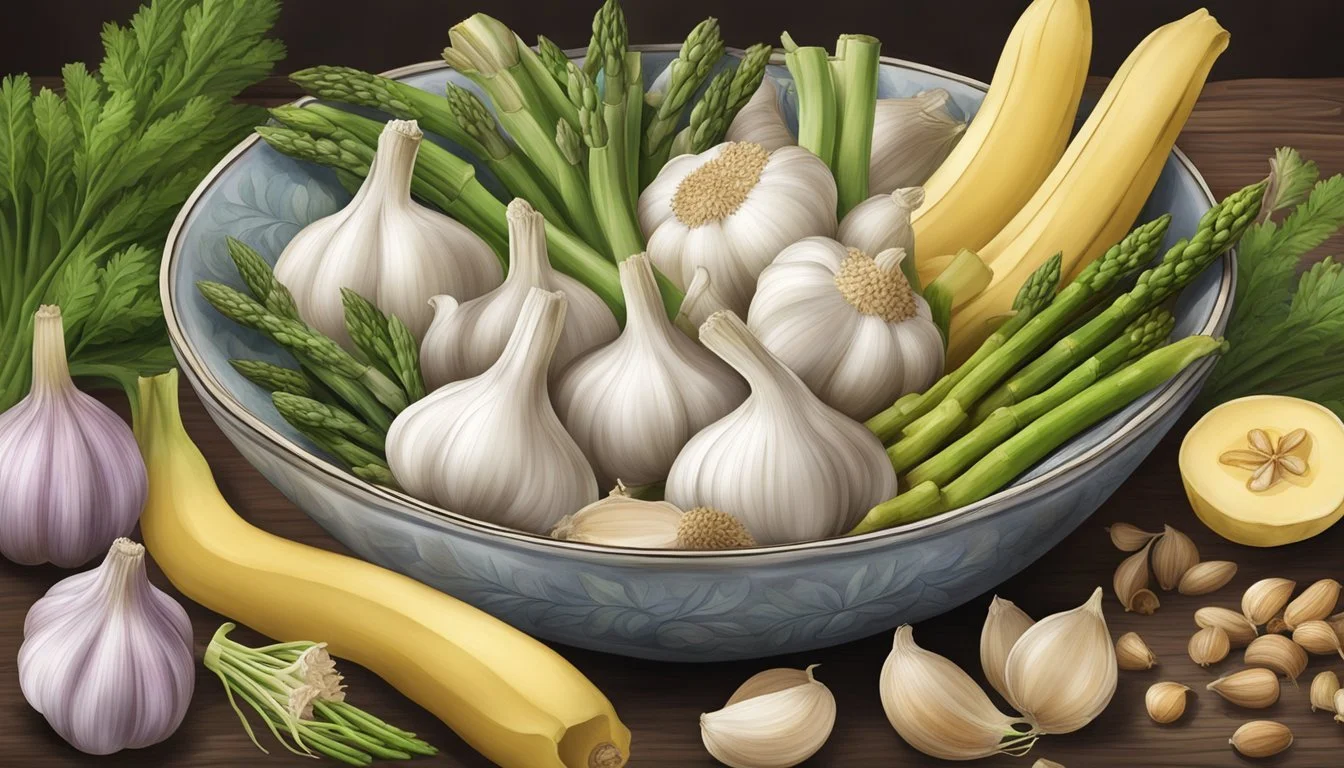Inulin-Rich Foods
Top Nutrient-Rich Sources Explained
Inulin, a type of soluble fiber found in a variety of plant foods, has gained attention for its potential health benefits, particularly for gut health. This natural prebiotic fiber supports a healthy digestive system by promoting the growth of beneficial gut bacteria. Understanding which foods are high in inulin can help individuals make informed dietary choices to support their digestive health.
Including inulin-rich foods in the diet not only aids digestion but also may contribute to other health benefits, such as improved blood sugar levels and enhanced satiety. Knowing more about these foods allows people to incorporate inulin effectively into their daily meals for better overall wellness.
1) Jerusalem Artichoke
Jerusalem artichokes are a top source of inulin, a type of prebiotic fiber beneficial for gut health. This tuber, also known as sunchoke, has a slightly nutty flavor and can be eaten raw or cooked.
Rich in vitamins and minerals, Jerusalem artichokes offer nutritional value. They contain iron, copper, magnesium, phosphorus, and potassium, alongside vitamin C and various B vitamins.
The iron in Jerusalem artichokes is non-heme iron, which is found in plant sources. This can be particularly beneficial for those following a vegetarian or vegan diet.
Incorporating Jerusalem artichokes into meals can help boost dietary fiber intake. This can aid in digestion and support overall gut health.
Jerusalem artichokes are versatile in the kitchen. They can be roasted, sautéed, or added to soups and salads, making them an easy and tasty addition to a healthy diet.
2) Chicory Root
Chicory root is one of the richest natural sources of inulin, a type of soluble fiber. This root is commonly used as a part of livestock feed but is increasingly recognized for its dietary benefits in humans.
The roots can be processed for use as a coffee substitute due to their naturally bitter flavor. This makes it a versatile addition to a variety of diets, especially for those looking to reduce their caffeine intake.
Chicory root can also be utilized in salads, where its leaves and flowers provide a fresh, slightly bitter taste. This not only adds a unique flavor but also contributes beneficial fiber.
In processed foods, chicory root extract is often added to improve fiber content. You might find it listed as inulin, oligosaccharide, or oligofructose on ingredient labels of products like yogurt, protein bars, and cereals. This inclusion helps promote better digestive health.
By stimulating bowel movements, the fiber in chicory root aids in maintaining regular bowel function. This function is crucial for overall digestive health.
Adding chicory root to your diet can offer a simple way to enhance fiber intake, which supports the gut microbiome and digestive system.
3) Dandelion Greens
Dandelion greens contain a notable amount of inulin, approximately 13.5 grams per 100-gram serving.
These greens are not just high in inulin; they also offer significant nutritional benefits. They are a rich source of vitamins A, C, and K. Additionally, they provide iron, calcium, and fiber, which contribute positively to a balanced diet.
Dandelion greens can be used in various culinary applications. They can be eaten cooked or raw, making them a versatile ingredient. Commonly, they are included in salads, soups, and herbal teas.
Dandelion greens have a slightly bitter taste, which can add complexity to dishes. Cooking them can soften this bitterness, making them a more palatable option for many.
In addition to their culinary uses, dandelion greens are often touted for their digestive benefits due to their high inulin content. This makes them a valuable addition for those looking to improve their gut health.
4) Garlic
Garlic is a notable source of inulin, a type of prebiotic fiber beneficial for gut health. With approximately 12.5 grams of inulin per 3.5 ounces, garlic stands out among allium vegetables for its prebiotic content.
In addition to inulin, garlic provides other nutrients such as vitamin C, vitamin B6, manganese, and selenium. These vitamins and minerals support various bodily functions and contribute to overall well-being.
Regular consumption of garlic can contribute to a healthier gut microbiome. The inulin in garlic feeds the beneficial bacteria in the digestive system, promoting better digestion and nutrient absorption.
Garlic can easily be incorporated into a variety of dishes, adding both flavor and health benefits. Roasting, sautéing, or adding raw garlic to salads are simple ways to increase inulin intake.
5) Onions
Onions are a versatile and widely-used vegetable in many cuisines. They are notable for their content of inulin, a type of prebiotic fiber.
Onions can provide benefits for gut health by encouraging the growth of beneficial bacteria in the digestive system.
While not everyone enjoys the taste of raw onions, their inulin content remains effective when they are cooked.
In addition to inulin, onions contain vitamins like vitamin C and various antioxidants.
These nutrients can contribute to overall health, making onions a valuable addition to a balanced diet.
Incorporating onions into meals can be as simple as adding them to salads, stir-fries, soups, or as a base for many dishes.
6) Leeks
Leeks are a versatile vegetable offering multiple health benefits, including being a good source of inulin.
This allium vegetable promotes healthy gut bacteria and supports digestion due to its high inulin content. In leeks, inulin not only helps with digestion but also aids in breaking down fats.
Leeks are also rich in vitamins and minerals. They contain Vitamin K, which is essential for bone health, and Vitamin A, which supports vision.
In terms of usage, leeks can be added to soups, stews, and salads. They provide a mild onion-like flavor and are often used as a base for various dishes.
Incorporating leeks into your diet can be an effective way to boost your inulin intake while enjoying a nutritious and flavorful vegetable.
7) Bananas
Bananas are a readily available fruit rich in inulin, though the content is not as high as in some other foods like chicory root or garlic.
Still, bananas are beneficial for gut health due to their prebiotic properties.
In addition to inulin, bananas contain fructooligosaccharides (FOS). Both inulin and FOS help promote the growth of beneficial gut bacteria.
Moreover, bananas are a convenient and tasty way to incorporate prebiotics into the diet.
The presence of inulin in bananas can aid in improving digestion and maintaining regular bowel movements.
Bananas also provide essential nutrients like potassium, vitamin C, and vitamin B6, making them a well-rounded choice for incorporating prebiotics.
Encouraging the growth of good bacteria in the gut can have numerous health benefits, and bananas are an easy way to support this goal.
Eaten on their own or added to smoothies and breakfast cereals, bananas can effortlessly become a regular part of a dietary routine.
Bananas offer a simple and effective way to boost overall gut health through their prebiotic content.
8) Asparagus
Asparagus is a notable source of inulin, a prebiotic fiber that promotes gut health. It contains fructans, which are beneficial for the growth of healthy gut bacteria.
This vegetable can be enjoyed both raw and cooked, making it a versatile addition to meals. Roasting asparagus enhances its natural flavors while preserving its nutritional benefits.
Regular consumption of asparagus can support digestive health through its fiber content. Including asparagus in a balanced diet may contribute to overall well-being, thanks to its prebiotic properties.
9) Wheat
Wheat is a common source of inulin, a type of prebiotic fiber. This fiber is abundant in whole wheat products such as bread, pasta, and cereal, contributing to digestive health.
Inulin found in wheat helps promote the growth of beneficial gut bacteria. It acts as food for these bacteria, aiding in maintaining a healthy digestive environment.
Whole wheat is also rich in vitamins and minerals, like B vitamins and magnesium. This makes it a nutritious choice beyond just its fiber content.
Including whole wheat in the diet is an effective way to boost inulin intake. Regular consumption can assist with bowel regularity and improve overall gut function.
10) Rye
Rye is a valuable source of inulin, a type of prebiotic fiber beneficial for gut health. This grain is traditionally used in making bread and other baked goods, offering a wholesome alternative to more common grains like wheat.
Consuming rye can support digestive health by promoting the growth of beneficial gut bacteria. Its high fiber content helps with maintaining regular bowel movements, contributing to overall digestive well-being.
Rye also provides essential nutrients such as manganese, selenium, and phosphorus. These minerals play critical roles in various bodily functions, from bone health to immune system support.
Incorporating rye into the diet can be as simple as choosing rye bread or adding cracked rye to soups and salads. This versatile grain can enhance meal variety while boosting fiber intake.
Health Benefits of Inulin
Inulin has several notable health benefits, including aiding digestive health, regulating blood sugar levels, and supporting weight management.
Digestive Health
Inulin is a type of soluble dietary fiber that significantly benefits the gut microbiome. Acting as a prebiotic, it nourishes beneficial bacteria like bifidobacteria and lactobacilli in the digestive system. This promotes a balanced and healthy gut flora.
Consumption of inulin can also help relieve constipation. It adds bulk to stools and stimulates bowel movements, which is particularly helpful for maintaining regularity. Studies suggest that about 10 grams of inulin per day can have positive effects on bowel function.
Blood Sugar Regulation
Inulin can aid in the regulation of blood sugar levels, which is especially beneficial for individuals with type 2 diabetes. It slows the digestion process, thereby preventing rapid spikes in blood glucose levels after meals.
Research indicates that inulin may improve insulin sensitivity. This makes it easier for the body to manage blood sugar effectively. People incorporating inulin into their diet may find it easier to control their glucose levels, which is critical for diabetes management.
Weight Management
Inulin plays an important role in weight management. It contributes to a feeling of fullness by taking up space in the digestive tract, which can lead to reduced calorie intake. This makes it easier for individuals to adhere to weight loss plans.
Additionally, inulin is low in calories compared to other carbohydrates. Its inclusion in the diet can help reduce overall calorie consumption while still providing satiety. Regular consumption may also aid in reducing visceral fat, which is closely linked to improved metabolic health.
Sources of Inulin
Inulin is a type of prebiotic fiber found in many plants, and it's known for promoting healthy gut bacteria. You can find inulin both in natural foods and in supplement form.
Natural Foods
Inulin occurs naturally in a variety of fruits, vegetables, and grains. Chicory root is one of the richest sources, often used in food products for its high inulin content. Another excellent source is Jerusalem artichokes, which contain significant levels of this prebiotic fiber.
Other common foods that contain inulin include bananas, garlic, and onions. These foods are not only rich in inulin but also bring various vitamins and minerals to your diet. Asparagus is also a good choice, particularly for those looking to increase their natural fiber intake without resorting to processed foods. Each of these plants supports digestive health by fostering beneficial bacteria in the gut.
Supplements
For those who may not get enough inulin through their diet, inulin supplements are available. These typically come in powder or capsule forms and can easily be added to daily routines. It's important to follow dosage recommendations on the package to avoid potential side effects like bloating or gas.
Inulin supplements are especially useful for individuals who have dietary restrictions that prevent them from consuming inulin-rich foods. Always look for supplements that list pure inulin without unnecessary additives. Adding these supplements to your diet can help you maintain healthy gut flora, supporting digestion and overall immunity.
How to Incorporate Inulin into Your Diet
Inulin is found in a variety of foods such as garlic, chicory root, and oats. Including these foods in your meals can enhance gut health and provide other nutritional benefits.
Cooking Tips
Garlic and Onions
Use garlic and onions in everyday cooking. Sauté them as a base for soups, stews, and stir-fries. Roasted garlic adds a deep flavor to dishes and can be spread on bread.
Chicory Root
Chicory root can be used as a coffee substitute. Brew it like you would coffee for a caffeine-free drink that’s rich in inulin.
Oats and Barley
Add oats or barley to your breakfast routine. Cook oats as oatmeal or use barley in soups and casseroles. These grains provide a moderate amount of inulin per serving.
Dandelion Greens
Include dandelion greens in salads or smoothies. They have a slightly bitter taste that pairs well with sweeter fruits in smoothies.
Daily Recommendations
Morning
Start your day with a bowl of oatmeal topped with berries. A single serving of oats includes up to 1 gram of inulin and additional fiber.
Lunch
Prepare a salad with dandelion greens, asparagus, and a handful of roasted chicory root. This combination provides diverse sources of inulin.
Dinner
Incorporate inulin-rich vegetables like leeks, garlic, and onions into your dinner recipes. Stir-fries, roasted vegetables, and soups are great options.
Snacks
For a snack, consider a chicory root beverage or a piece of garlic-infused sourdough bread. These options not only satisfy but also contribute to your daily inulin intake.
By strategically adding these foods to each meal, one can effortlessly incorporate beneficial amounts of inulin into their diet.
Potential Side Effects
Inulin, while beneficial for many, may cause certain issues for some individuals, especially when consumed in large amounts. Among the most common side effects are gastrointestinal problems.
Gastrointestinal Issues
Large doses of inulin can lead to discomfort in the digestive system. Gas and bloating are frequently reported symptoms, due to the fermentation process in the gut.
Some people might experience loose stools or diarrhea. This often occurs when they ingest amounts exceeding their body's tolerance.
Individuals sensitive to certain types of fiber should introduce inulin gradually. Starting with small doses can help mitigate potential issues and allow for better adjustment over time.
Careful consideration is advised for those with preexisting digestive conditions, as they might be more susceptible to these symptoms.








